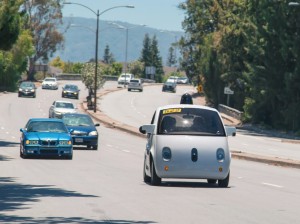It is something of a cliche nowadays to talk about technology as a disruptive force. But as automakers wrestle with the prospect of driverless cars and motorists who don’t own their vehicles, insurance companies could be facing something akin to a catastrophe, according to a new study by Driverless Transportation.
Autonomous vehicles are bound to disrupt the insurance industry, according to the latest warnings from consultants who have studied the insurance business recently.
Several of the consultants released reports recently suggesting auto insurers face will face daunting challenges in the future.
The international consulting firm of KMPG, according to Driverless Transportation, reports that the advanced safety and accident avoidance systems in autonomous vehicles could lead to decline in accidents-per-vehicle of as much as 80%. That in turn will cause a decline in the current auto insurance industry, which could shrink to 40% of its current size by 2040, KPMG believes.
Meanwhile, auto insurance executives don’t see the threat of the technology, at least in the near term, KPMG writes in its study, “Automobile Insurance in the era of autonomous vehicles.”
As part of its report, KPMG conducted a survey of top insurance executives. More than 95% say autonomous vehicle technology will have no impact on their industry by 2020. Their attitude bends somewhat when discussing six to 10 years out, with 41% of the executives saying the technology will impact their industry somewhat or very significantly by 2025.
Meanwhile, Deutsche Bank this month predicted the drastic changes to industry will happen on a faster timeline than that foreseen by KPMG.
In an analysts report on Progressive Insurance, Deutsche Bank predicted that self-driving cars along with ride sharing will completely change the demand for insurance and the flow of revenue from premiums. There could be a large number of accident-free cars on the roads in 10 years, and it’s not clear there will be an auto insurance industry in 20 years, according to Deutsche Bank’s survey.
(Insurance companies unfairly use marital status to penalize motorists. For more, Click Here.)
And then there’s David Powell, a manager with Lloyd’s Market Association, who was quoted in the trade publication Insurance Age, predicting that changes in the way people drive will lead to consolidation among auto insurers. Accident liability could move from the vehicle owner to the manufacturer, further fracturing the insurance industry.
Consumer studies done by organizations such the University of Michigan Transportation Research Institute suggest the lure of accident free – and hence insurance free – could become one of the primary engines that will drive the acceptance of autonomous vehicles in the future.
While only a small percentage of drivers say they would be completely comfortable in a driverless car, a sizable amount would have no problem as long as they retain some control, according to a new University of Michigan report.
(Click Here for details about Scion’s efforts to reconnect with young buyers.)
UMTRI Researchers Brandon Schoettle and Michael Sivak of the U-M Transportation Research Institute examined motorists’ preferences for vehicle automation, including their overall concern about riding in self-driving cars. The researchers surveyed 505 licensed drivers and found about 44% prefer to retain full control while driving. Nearly 16% would rather ride in a completely self-driving vehicle, while almost 41% said they prefer a partially self-driving vehicle with only occasional control by the driver.
Male drivers and drivers under 45 are more likely to favor partially or completely self-driving vehicles, the researchers say. “Self-driving vehicles are often discussed in regard to their potential safety, energy-consumption and environmental benefits, or the existing technical challenges that must be overcome for their successful implementation,” Schoettle said. “However, less attention has been paid to considering the actual level of automation, if any, that drivers desire in their vehicle.”
While about two-thirds of those surveyed said they are at least moderately concerned about riding in completely self-driving vehicles, that percentage drops to less than half for partially self-driving cars. Women and those 45 and older are more apt to have concerns with either level of automation.
According to the U-M report, nearly all respondents (96%) would want to have a steering wheel and gas and brake pedals available in completely self-driving vehicles.
(To see more about how automakers are struggling to keep hackers out of cars, Click Here.)
As for partially self-driving vehicles, 59% of those surveyed said they prefer a combination of three warning modes (sound, visual, vibration) to notify drivers when to take control of the vehicle. About 19% thought that sound and visuals would be enough.


I laugh at the crystal ball predictions and proposed scenarios. There have been several surveys showing most woman and almost half of all men surveyed would not buy or use an AV. The assumption that our entire society will switch to AVs in 10-20 years is a fallacy just like the predicted paperless office once PCs became common. In addition there pie-in-the-sky belief that there will be an 80% reduction in accidents-per-vehicle is totally unrealistic.
As far as insurance companies are concerned, they will be around for a long, long time because the states will continue to mandate auto insurance – which they should. What will happen however is that people who actually drive their cars will receive drastic rate hikes to cover the accidents caused by AVs and there will be plenty. The delusion that AVs won’t cause or be involved in accidents is foolish and shows a lack of understanding.
The problem the authorities will have is determining which AV caused the pill-up so that vehicle/owner can be cited. Then the insurance companies and injured parties will get to sue and fight it all out in court costing millions. Non-AV commuters will pay for it all.